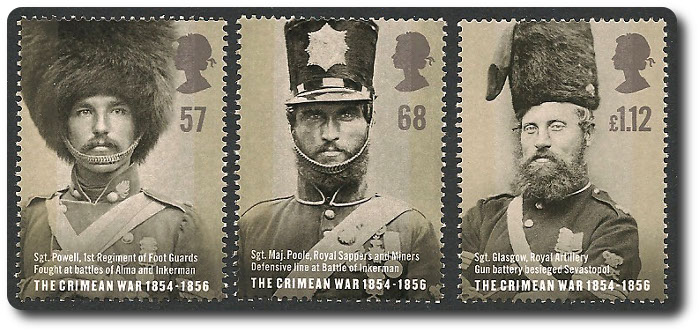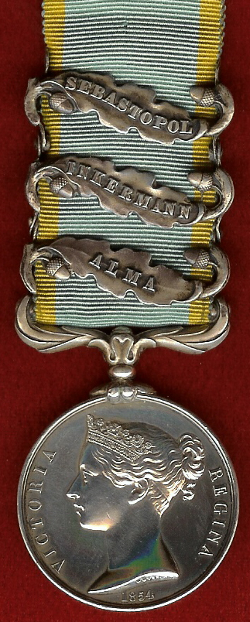Topic: Discipline

The Court Martial of Thomas Tole
Extraordinary and Disgraceful Treachery
The Glasgow Herald, 24 September 1958
 London, Sep. 22.—A worthless scoundrel, who deserted to the enemy from the English ranks when before Sebastopol, and by his treachery caused the slaughter of a number of his comrades, has just been captured, and awaits sentence of a court-martial. On the 22d of March, 1855, the 7th Regiment of Fusiliers were performing trench duty, when two of the men, Private Thomas Tole, and a companion named Moore, left the lines under pretence of searching for fuel, and instead of returning, went over to the enemy. The treacherous information they gave of the position of the company they had deserted from, proved a guide to the Russians, who, making a determined attack upon them the same night, killed Captain the Hon. Cavendish Brown and thirty men. Tole was not given up with the exchange of prisoners at the end of the war, but went to St. Petersburg. Desiring, subsequently, to return to England, he contrived to obtain a passport, and has been for some time in York. More recently he took up his quarters in old Mount Street, Manchester. Several months ago, Mr. Leary, superintendent of the B division, had him taken into custody on suspicion of being guilty of this heinous and disgraceful offence, but the evidence failed to prove his desertion. Later correspondence with the commanding officer, however, led to the production of witnesses who could speak more positively; and on Monday Tole was again placed before the city magistrate, when two of his former comrades in the same company, to whom he was personally known, gave evidence regarding his going over to the enemy, and he was ordered to be delivered over to the military authorities. Tole is a native of Ireland, and 24 years of age. A man of the same regiment, named Dennis Cleary, who was wounded, and has since received his discharge, is now a police officer in the B division. Tole states that his companions, Moore, died in two days after they joined the Russians. (Manchester Examiner)
London, Sep. 22.—A worthless scoundrel, who deserted to the enemy from the English ranks when before Sebastopol, and by his treachery caused the slaughter of a number of his comrades, has just been captured, and awaits sentence of a court-martial. On the 22d of March, 1855, the 7th Regiment of Fusiliers were performing trench duty, when two of the men, Private Thomas Tole, and a companion named Moore, left the lines under pretence of searching for fuel, and instead of returning, went over to the enemy. The treacherous information they gave of the position of the company they had deserted from, proved a guide to the Russians, who, making a determined attack upon them the same night, killed Captain the Hon. Cavendish Brown and thirty men. Tole was not given up with the exchange of prisoners at the end of the war, but went to St. Petersburg. Desiring, subsequently, to return to England, he contrived to obtain a passport, and has been for some time in York. More recently he took up his quarters in old Mount Street, Manchester. Several months ago, Mr. Leary, superintendent of the B division, had him taken into custody on suspicion of being guilty of this heinous and disgraceful offence, but the evidence failed to prove his desertion. Later correspondence with the commanding officer, however, led to the production of witnesses who could speak more positively; and on Monday Tole was again placed before the city magistrate, when two of his former comrades in the same company, to whom he was personally known, gave evidence regarding his going over to the enemy, and he was ordered to be delivered over to the military authorities. Tole is a native of Ireland, and 24 years of age. A man of the same regiment, named Dennis Cleary, who was wounded, and has since received his discharge, is now a police officer in the B division. Tole states that his companions, Moore, died in two days after they joined the Russians. (Manchester Examiner)

General Court Martial on the Deserter to the Russians
The Glasgow Herald, 29 November 1958
Chatham, Nov. 26.—This morning, at eleven o'clock, a general court martial assembled at this garrison, by command of the Duke of Cambridge, for the trial of Private Thomas Tole, of the 1st battalion 7th Royal Fusiliers, who, when stationed in the Crimea with his regiment, in the early part of 1855, deserted to the Russian army. Lieutenant-Colonel Charles E. Fairtlough, commanding the 3d battalion, was president.
The prisoner on being brought into the room appeared very pale, but this, perhaps, arose from the lengthened period he has been in confinement, He appears to be about 26 years of age.
The Deputy Judge-Advocate read over the charge to the prisoner as follows:—"For having, in the month of January, 1855, when in the service of her Majesty, and with the army in the field in the Crimea, deserted and gone over to the enemy."
The prisoner, on being called upon, pleaded "Not Guilty."
All the witnesses were then ordered out of court, and the following evidence was afterward taken:—
Sergeant James Osmotherly, 7th Royal Fusiliers, said he belonged to the same company as the prisoner, and was in the same tent with him during the time the 7th Fusiliers were in the Crimea. In the month of January, 1855, the prisoner was one day warned for fatigue duty of Sergeant Ball, and was ordered, with another man, to go out and search for fuel. Prisoner was away between two and three hours when he was reported absent. The colonel ordered witness, Sergeant Ball, and another man to go out and see if they could find him. They first went over to Inkermann, and then passed round to the White House ravine, where the British picket was stationed. They inquired of the picket if they had seen any man go down after fuel, when they received the answer that they had, but that they did not know whether he came back again. Witness never saw prisoner again until he saw him a prisoner at Chatham.
By the Prosecutor—The men at that time were allowed to go for fuel in advance of the White House picket. Witness should say the White House picket was about 100 yards from the Russian picket, but he was not confident as to the distance, as advanced pickets were thrown out at night.
The prisoner declined asking this witness any questions.
Private George Hines, 7th Fusiliers, and other witnesses gave similar testimony.
Joseph Hurst, a police constable, of the Manchester police force, said he apprehended the prisoner in a beerhouse in that city of the 18th of September, on suspicion of being a deserter from the 7th Fusiliers.
The President (to the prisoner)—Have you any statement you wish to address to the Court?
Prisoner said he had, and proceeded to address the court as follows:—On the 17th of January, 1855, my company was warned for night duty, and on the morning of the 18th the picket came and relieved us, and we were marched to our tent. I had not time to file my firelock when another man and myself were ordered on wood fatigue. We went to try and get a few roots to boil our breakfast with, when two Russian officers came up to us and asked us what we were doing. We told them we were on fatigue, gathering wood. They asked us if we would go with them to take a wounded man in, and we consented to accompany them. They took us down into Inkermann, when, as we were going along, I told my comrade that we had better make a stand, as we were going too far, and try and get home. The officers then drew their swords, on which we wrestled with them, but having no arms, we were obliged to give in. I was wounded in the left arm. I was then marched into Sebastopol a prisoner.
The finding will not be known until it has been forwarded, together with all the evidence and the prisoner's defence, to the Duke of Cambridge for the approval of his Royal Highness.

The Annals of Our Time: A Diurnal of Events, Social and Political, Home and Foreign, from the Accession of Queen Victoria
June 20, 1837, Volume 1, By Joseph Irving, Macmillan and Company, 1871
26 November 1858.—At a court martial at Chatham, Private Thomas Tole, late of the 1st battalion 7th Royal Fusiliers, was found guilty of deserting to the Russians from the army before Sebastopol. He was sentenced to penal servitude for life.

